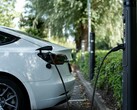After China, the US now gets its first grid-level energy storage system with sodium-ion batteries that require no active cooling and cost a third less than a traditional BESS with lithium phosphate batteries.
The first sodium-ion BESS has been deployed in the US by the Peak Energy startup, about two years after it announced its intention to build one.
Grid-level energy storage systems with sodium-ion batteries are already operational in China, built by juggernauts like BYD, the world's second-largest cell maker, but the American-made solution is the first one with passive cooling, making it cheaper and safer.
Unlike traditional LFP batteries of the type used in the popular Anker Solix C1000 mobile station and big electricity storage projects alike, the sodium-ion cells have fewer flammable components, making them inherently safer than lithium batteries. They are also cheaper to manufacture, as the material they use is affordable and abundant.
Peak Energy is one of the most promising battery startups in the US, and its success in delivering not a prototype, but an actual commercial product ready to scale is a commendable achievement. The containers deployed on a megawatt-hour scale are the largest sodium-ion battery system with phosphate pyrophosphate (NFPP) cathode chemistry in the world.
Besides energy density comparable to LFP cells and higher thermal safety, Peak Energy's first NFPP energy storage system in the US comes out 20% cheaper to operate over its lifespan. Thanks to the less reactive chemistry, the NFPP cells also degrade a third slower than those in lithium phosphate systems over the same period, potentially allowing utilities to exploit the Peak Energy BESS for longer.
What sets it further apart is the first passive cooling that immediately removes about 90% of the hazards around grid-level energy storage installations as their moving parts and electrical components are where the vast majority of fires occur, rather than thermal runaway episodes in the cells themselves.
While costs and safety are important considerations, the Peak Energy sodium-ion BESS deployment also slots well in the general domestic trend favoring made-in-US products that has largely excluded the American battery industry so far, since globally it has been dominated by China.



















